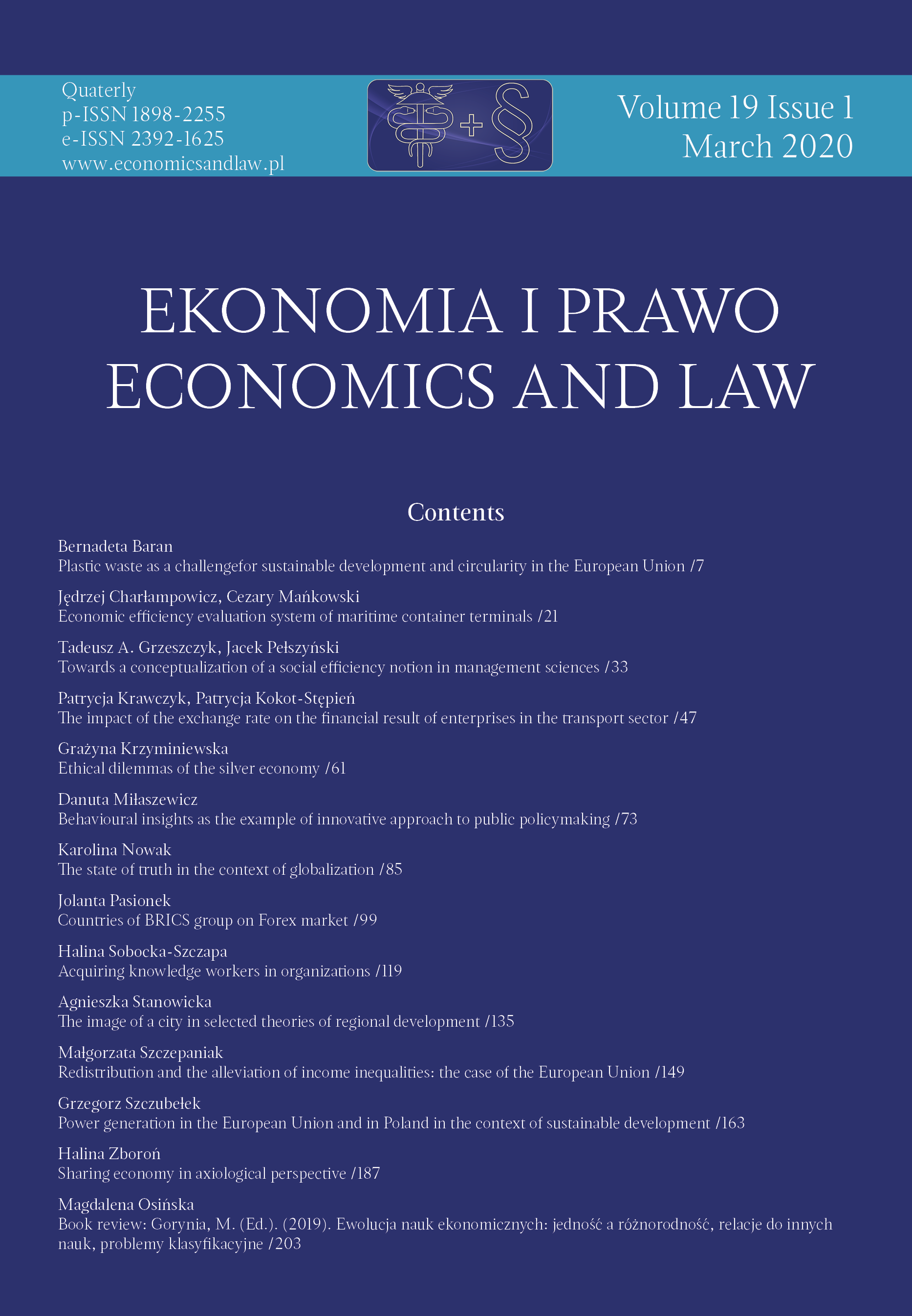Sharing economy in axiological perspective
DOI:
https://doi.org/10.12775/EiP.2020.013Keywords
sharing economy, entrepreneurship model, social movement, axiologyAbstract
Motivation: The issue of sharing economy is the subject of a broad debate in the circle of politicians and economists who see it as an opportunity for boosting economic development. Simultaneously, there have been discussions about non-economic significance of this phenomenon and its impact on other areas of social life.
Aim: The aim of this paper is to show that the dispute concerning the values for this area of phenomena is mainly a result of lack of unresolved issues related to an adopted axiological perspective. The author’s intention is to present argumentation supporting the thesis that the term ‚sharing economy’ may by referred to two — relating to various normative beliefs — categories of social phenomena: business practice and social movement.
Results: Inclusion of various axiological contexts leads to diverse characteristics of the phenomena belonging to the sharing economy practice and the identification of their social significance.
References
Acquier, A, & Carbone, V. (2018). Sharing economy and social innovation. In N.M. Davidson, M. Finck, & J.J. Infranca (Eds.), The Cambridge handbook of sharing economy and law. Cambridge–New York: Cambridge University Press. doi:10.1017/9781108255882.
Albinsson, P.A., & Perera, B.Y. (2012). Alternative marketplaces in the 21st century: building community through sharing events. Journal of Consumer Behaviour, 11(4). doi:10.1002/cb.1389.
Belk, R. (2010) Sharing. Journal of Consumer Research, 35(6). doi:10.1086/612649.
Belk, R. (2014). Sharing versus pseudo-sharing in Web 2.0. Anthropologist, 18(1). doi:10.1080/09720073.2014.11891518.
Benkler, Y. (2004). Sharing nicely: on shareable goods and the emergence of sharing as a modality of economic production. The Yale Law Journal, 114(2). doi:10.2307/4135731.
Botsman, R. (2013). The sharing economy lakcs a shared definition. Retrieved 15.05.2019 from https://www.fastcompany.com.
Botsman, R. (2015). Defining the sharing economy: what is collaborative consumption and what isn’t? Retrieved 02.07.2019 from https://www.fastcompany.com.
Cohen, B., & Kietzmann, J. (2014). Ride on!: mobility business models for the sharing economy. Organization & Environment, 27(3). doi:10.1177/1086026614546199.
Curtis, S.K., & Lehner, M. (2019). Defining the sharing economy for sustainability. Sustainability, 11(3). doi:10.3390/su11030567.
Czernek, K., Wójcik, D., & Marszałek, P. (2018). Trust in the sharing economy. Gospodarka Narodowa, 295(3). doi:10.33119/gn/100487.
European Economic and Social Committee. (2016). Opinion of the European Economic and Social Committee on ‘Communication from the Commission to the European Parliament, the Council, the European Economic and Social Committee and the Committee of the Regions: a European agenda for the collaborative economy’ (COM(2016) 356).
Frenken, K., & Schor, J. (2017). Putting the sharing economy to perspective. Environmental Innovation and Societal Transitions, 23. doi:10.1016/j.eist.2017.01.003.
Grybaitė, V., & Stankevičienė, J. (2016). Motives for participation in the sharing economy: evidence from Lithuania. Ekonomia i Zarządzanie, 8(4). doi:10.1515/emj-2016-0028.
Janczewski, J. (2017). Konsumpcja współdzielona a przedsiębiorczość. Przedsiębiorczość: Edukacja, 13. doi:10.24917/20833296.13.19.
John, N. (2013a). Sharing, collaborative consumption and Web 2.0. Media@LSE Elactronic Working Paper, 26.
John, N. (2013b). The social logics of sharing. The Communication Review, 16(3). doi:10.1080/10714421.2013.807119.
Kamal, P., & Chen, J.Q. (2016) Trust in sharing economy. In T.-P. Liang, S.-Y. Hung, P.Y.K. Chau, & S.-I Chang (Eds.), PACIS 2016 Proceedings. Atlanta: Association for Information Systems.
Lutz, C., & Newlands, G. (2018). Choice and discrimination in sharing economy. SSRN Electronic Journal. doi:10.2139/ssrn.3241682.
Martin, C.J. (2016). The sharing economy: a pathway to sustainability or a nightmarish form of neoliberal capitalism? Ecological Economics, 121. doi:10.1016/j.ecolecon.2015.11.027.
Nguyen, S., & Llosa, S. (2018) On the difficulty to define the sharing economy and collaborative consumption: literature review and and proposing a different approach with the introduction of ‘collaborative services’. Journée de la Relation à la Marque dans un Monde Connecté, November.
PwC. (2016). (Współ)dziel i rządź!: twój nowy model biznesowy jeszcze nie istnieje. Retrieved 02.05.2019 from https://www.pwc.pl.
Ranzini, G., Etter, M., Lutz, C., & Vermeulen, I. (2017). Privacy in the sharing economy: report from the EU H2020 research project Ps2Share: participation, privacy, and power in the sharing economy. doi:10.2139/ssrn.2960942.
Reich, R.B. (2015) The share-the-scraps economy. Retrieved 06.12.2019 from https://robertreich.org.
Schor, J. (2016). Debating sharing economy. Journal of Self-Governance and Management Economics, 4(3). doi:10.22381/jsme4320161.
Schor, J., & Attwood-Charles, W. (2017). The ‘sharing’ economy: labour, inequality, and social connections on for profit platforms. Sociology Compass, 11(8). doi:10.1111/soc4.12493.
Statista. (2019) Retrieved 03.05.2019 from https://www.statista.com.
Teubner, T., & Flath, C.M. (2019). Privacy in the sharing economy. Journal of the Association for Information Systems, 20(3). doi:10.17705/1jais.00534.
Downloads
Published
How to Cite
Issue
Section
Stats
Number of views and downloads: 621
Number of citations: 0
